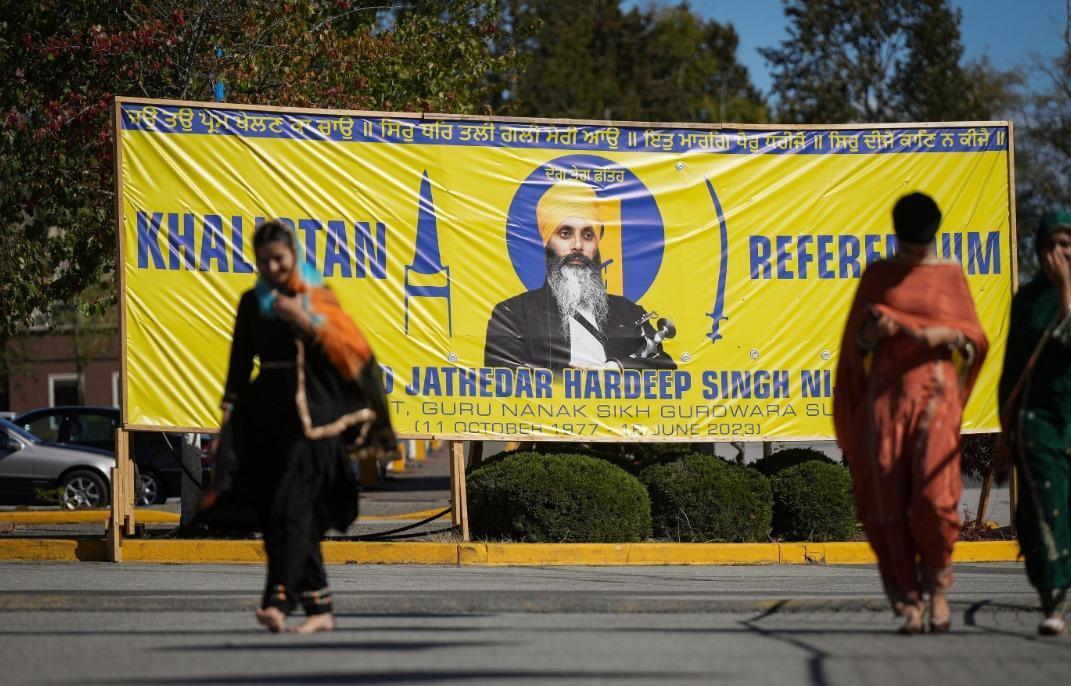Canada links India to slaying of Sikh exile, expels intel chief
NEW DELHI

Canada on Monday accused India's government of involvement in the killing of a Canadian Sikh leader near Vancouver last June, prompting tit-for-tat diplomatic expulsions after New Delhi rejected the charge as "absurd."
The accusations sent already sour relations between Ottawa and New Delhi to a dramatic new low.
Prime Minister Justin Trudeau told an emergency parliamentary session that his government had "credible allegations" linking Indian agents to the June slaying of exiled Sikh leader Hardeep Singh Nijjar in British Columbia.
"The involvement of any foreign government in the murder of a Canadian citizen on Canadian soil is an unacceptable violation of our sovereignty," Trudeau said.
He called "in the strongest possible terms" on the Indian government to cooperate in clearing up the matter.
Foreign Minister Melanie Joly said the Trudeau government had taken immediate action.
"Today we have expelled a senior Indian diplomat from Canada," she said, without naming the official.
Jolie said the expelled Indian is the head of the Research and Analysis Wing (RAW), India's foreign intelligence agency, in Canada.
India's foreign ministry on Tuesday rejected claims of involvement in Nijjar's death and said it had ordered an unnamed senior Canadian diplomat to leave the country within five days.
"Allegations of Government of India's involvement in any act of violence in Canada are absurd," the ministry said in a statement, adding: "We are a democratic polity with a strong commitment to rule of law."
It said Trudeau -- who visited New Delhi this month for the G20 summit -- had already made similar allegations to his Indian counterpart Narendra Modi, and that they had been "completely rejected."
The ministry's decision to expel a Canadian diplomat reflected its "growing concern at the interference of Canadian diplomats in our internal matters and their involvement in anti-India activities," it added.
Nijjar, whom India had declared a wanted terrorist, was gunned down on June 18 in Surrey, a suburb of Vancouver that is home to a large Sikh community.
Canada has the largest population of Sikhs globally outside of India.
Nijjar advocated for the creation of an independent Sikh state to be carved out of parts of northern India and perhaps part of Pakistan.
New Delhi had accused Nijjar of carrying out terrorist attacks in India, a charge he denied.
Tense G20 meeting
Tensions between India and Canada have been simmering over the unsolved slaying, and Indian unhappiness over how Ottawa has handled right-wing Sikh separatists.
A former adviser to Trudeau, Jocelyn Coulon, asserted that Canada's accusation would have "the effect of a bomb around the world."
India will join "the group of nations that assassinate political opponents" abroad, much as Saudi Arabia orchestrated the murder of journalist Jamal Khashoggi in Turkey in 2018, said Coulon, who is now an independent researcher.
Tensions between the two nations flared during the G20 summit.
Modi expressed "strong concerns about continuing anti-India activities of extremist elements in Canada" during a meeting with Trudeau, according to an Indian government statement.
India has often complained about activities of the Sikh diaspora abroad, particularly in Canada, which New Delhi believes could revive a Sikh separatist movement.
The Indian state of Punjab, which is 58 percent Sikh and 39 percent Hindu, was rocked by a violent separatist movement in the 1980s and early 1990s, in which thousands died.
Canada also recently suspended negotiations for a free-trade agreement with India.
Trudeau later told media that Canada would always defend "freedom of expression, freedom of conscience and freedom of peaceful protest" while acting against hatred.
















